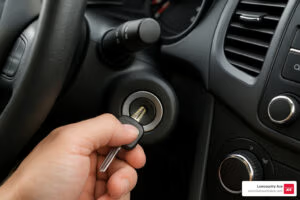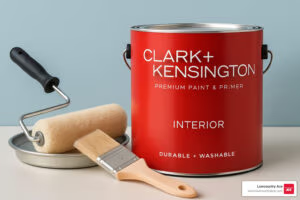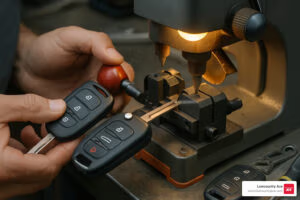Quick Answer to Remove Rust from Garden Tools:
- Sanding for manual removal.
- Vinegar and Salt Soak for natural chemical removal.
- Baking Soda Paste for small areas and stains.
- Oxalic Acid for tough, stubborn rust.
Rust on your garden tools is not just an eyesore; it’s a sign that your tools are undergoing a destructive chemical reaction. When iron or steel tools are exposed to water and oxygen, they form iron oxide, or what we commonly call rust. This doesn’t just affect the tool’s appearance; it can significantly hinder its performance and shorten its lifespan.
But don’t worry, the helpful team at Lowcountry Ace has quick, effective solutions that will tackle rust in less than an hour, leaving your tools looking as good as new. Our guide is straightforward and made especially for DIY enthusiasts and homeowners in mind. Whether you’re facing a lightly rusted shear or a heavily corroded shovel, we’ve got you covered with practical, easy-to-follow solutions.
Keep reading to discover how simple ingredients from your home can rescue your tools from rust, and crucially, how you can prevent rust from taking over your toolshed items in the future. Let’s dive into rust removal and protection, ensuring your garden tools remain in prime condition for your next gardening project.
Understanding Rust on Garden Tools
When your cherished garden tools start showing signs of rust, it can be a real headache. But what exactly is this unwelcome guest that takes over our tools? Rust, or as scientists call it, iron oxide, is what happens when iron combines with oxygen in the presence of water or moisture. This is not just a surface issue; it can deeply affect the integrity and functionality of your tools.
Iron Oxide
At its core, rust is a chemical reaction. It’s not just about the orange-brown flaky stuff you see; it’s about the degradation of the metal itself. Iron oxide forms when the iron in your garden tools reacts with oxygen from the air or water. This reaction is a form of corrosion that, over time, can eat away at the metal, making your tools weaker and less effective.
Long-term Exposure
The key factor in rust formation is long-term exposure to moisture. It doesn’t require a pool of water; even high humidity or the dew from a cool morning can be enough to kickstart the rusting process. This is why tools left outside or stored in damp conditions are particularly vulnerable. Over time, the continuous exposure accelerates the rusting process, leading to significant damage.
Moisture
Moisture is the catalyst in the rusting equation. Water facilitates the transfer of electrons from the iron to the oxygen, speeding up the oxidation process. It’s not just liquid water that’s the problem; water vapor in the air can also contribute to rust. This is why even in relatively dry environments, tools can still rust if they’re exposed to the air for too long without protection.
Understanding these elements is crucial in tackling rust. It’s not just about removing what you can see; it’s about understanding and interrupting the chemical process that causes rust in the first place. By keeping your tools dry, clean, and well-maintained, you can prevent rust from forming and ensure your garden tools last longer, saving you time, effort, and money in the long run.
Armed with this knowledge, you’re now ready to explore the most effective methods for removing rust from your garden tools. Whether it’s a vinegar soak or a more robust commercial rust remover, the key is to act quickly and prevent long-term damage. The helpful team at Lowcountry Ace is always here to provide advice and solutions for all your gardening tool needs.
Next, we’ll dive into the Quick and Effective Rust Removal Methods that will help you restore your tools to their former glory.
Quick and Effective Rust Removal Methods
When you’re faced with the question, “how do I remove rust from garden tools,” the answer lies in a few simple, yet effective methods. Let’s explore how you can get rid of rust and bring back the shine to your gardening tools.
Vinegar and Salt Method
Using vinegar and salt is a tried and true method for removing rust. Cleaning vinegar is slightly stronger than white vinegar, making it a potent rust remover due to its 6% acidity level. Here’s how to use it:
- Mix a solution of one part water to one part cleaning vinegar, and add a tablespoon of salt per cup of vinegar for extra rust-fighting power.
- Soak your rusted garden tools in the mixture for at least 24 hours. For larger tools, you can apply the mixture with a cloth and wrap them in plastic to keep them moist.
- Scrub the loosened rust off with a scouring pad or brush.
- Rinse and dry your tools thoroughly after the soak.
This method is great for tools with significant rust.
Baking Soda Technique
Baking soda works well for tools with smaller rust spots. Here’s what to do:
- Create a paste using baking soda and water, aiming for a consistency that’s thick enough to stick to the surface of your tools.
- Apply the paste to the rusted areas and let it sit for a couple of hours.
- Scrub the rust away with a brush or scouring pad.
- Rinse the tool under water and dry it immediately.
This method is gentle and safe for almost all types of garden tools.
Using WD-40
WD-40 is not just a lubricant; it can also remove surface rust quickly.
- Spray WD-40 directly onto the rusted area of your tool.
- Wait a few minutes for it to penetrate the rust.
- Wipe the area with a clean cloth to remove the rust.
- Apply another light spray to act as a protective layer against future rust.
This method is best for light rust and as a preventive measure.
Oxalic Acid for Stubborn Rust
For garden tools that are heavily rusted, oxalic acid is a powerful solution:
- Dilute oxalic acid in water according to the manufacturer’s instructions. Typically, a ratio of 1 part acid to 10 parts water works well.
- Soak the tools in the solution for up to 20 minutes.
- Scrub away the rust with a brush.
- Rinse the tools thoroughly and dry them immediately.
Safety Precautions: Always wear gloves and eye protection when handling oxalic acid, and work in a well-ventilated area.
These methods provide effective solutions to the common problem of rust on garden tools. Whether you choose the gentle touch of baking soda or the strength of oxalic acid, remember to finish by thoroughly drying your tools and applying a protective coating to prevent future rust. With proper care and maintenance, your garden tools can last for many seasons, and the helpful team at Lowcountry Ace is always ready to assist with products and advice to keep your tools in top shape.
Preventing Rust on Your Garden Tools
After learning how do I remove rust from garden tools, it’s crucial to focus on preventing rust from forming in the first place. Rust not only damages your tools but also makes gardening tasks more challenging. Follow these simple yet effective tips to keep your garden tools looking and working like new.
Rust Prevention Tips
Dry Storage:
- Keep it Dry: Always store your garden tools in a dry place. Moisture is the main cause of rust, so a shed, garage, or tool cabinet that protects them from the elements is ideal. If you don’t have an indoor space, consider using waterproof covers.
Protective Coatings:
- Oil Them Up: After each use and cleaning, apply a thin layer of multi-use oil on the metal parts of your tools. This oil acts as a barrier against moisture and air, significantly reducing the risk of rust.
- Corrosion Inhibitor Spray: For an extra layer of protection, use a corrosion inhibitor spray. It’s specially designed to prevent rust and can be easily applied to the metal surfaces of your tools.
Regular Maintenance:
- Wipe After Use: Make it a habit to wipe down your tools with a clean cloth after each use. Removing dirt and moisture immediately can go a long way in preventing rust.
- Inspect Regularly: Regularly check your tools for signs of rust or damage. Early detection means you can address the issue before it worsens.
Tool Cleaning Station:
- DIY Station: Set up a simple cleaning station in your garage or shed. This can be as straightforward as a bucket filled with sand and a bit of oil. After using your tools, plunge them into the sand a few times. The abrasive action of the sand helps clean the tools, while the oil coats them, preventing rust.
By implementing these rust prevention tips, you can ensure your garden tools remain in excellent condition, saving you time and money in the long run. Taking care of your tools is just as important as taking care of your garden. And for any supplies or advice you need, the helpful team at Lowcountry Ace is always there to help.
Transitioning into the next section, let’s address some common questions you might have about removing rust from garden tools. Whether it’s finding an alternative to vinegar for rust removal or understanding the safety of using rusted tools, we’ve got you covered.
FAQs on Removing Rust from Garden Tools
When it comes to maintaining your garden tools, questions often arise, especially about rust removal. Let’s dive into some frequently asked questions to give you clarity and ensure your tools stay in top condition.
Can I use lemon and salt instead of vinegar?
Yes, you can use lemon and salt as an alternative to vinegar for rust removal. The acid in lemon juice works similarly to vinegar, helping to break down the rust. Combine lemon juice with salt to create a paste, apply it to the rusted area, and let it sit for a couple of hours. Then, scrub off with a brush. This method is particularly useful for small spots of rust.
How often should I clean my garden tools to prevent rust?
Regular cleaning is key to preventing rust. It’s a good practice to clean your tools after each use. Wipe off any soil, sap, or moisture with a dry cloth. For a more thorough cleaning, washing with soapy water and drying them completely before storage is recommended. To prevent rust, apply a light coat of oil or a corrosion inhibitor spray. Doing this routine maintenance can significantly extend the life of your tools.
Is it safe to use rusted garden tools?
Using rusted garden tools is not recommended for several reasons. Firstly, rust can weaken the tool, making it less effective and potentially unsafe to use. Secondly, rusted tools can cause damage to your plants, as jagged or dull edges can harm plant tissues, making them more susceptible to diseases. Lastly, there’s a slight risk of tetanus if you cut yourself with a rusted tool, although it’s the bacteria in soil that poses a greater risk, not the rust itself. It’s best to remove rust and maintain your tools to keep them safe for use.
In conclusion, maintaining your garden tools by regularly cleaning and removing rust not only keeps them safe for use but also extends their lifespan. The helpful team at Lowcountry Ace is always there to assist you with products and advice for all your garden tool maintenance needs. A little effort in maintenance goes a long way in ensuring your gardening success.
Conclusion
Rust removal is more than just a chore—it’s an essential part of keeping your garden tools in prime condition. By understanding how do I remove rust from garden tools, you can ensure that your tools are always ready for the job at hand. It’s not just about aesthetics; removing rust can significantly extend the lifespan of your tools, making your investment in quality gardening tools truly worthwhile.
At Lowcountry Ace, we understand the importance of maintaining your garden tools to keep them functioning optimally for years to come. That’s why we offer a range of products and expert advice to help you tackle rust and prevent it from taking over your valuable equipment. From simple household remedies like vinegar soaks to more robust solutions like oxalic acid, we have everything you need to keep rust at bay.
Regular maintenance, including rust prevention and removal, not only keeps your tools safe for use but also significantly extends their lifespan. The helpful team at Lowcountry Ace is always here to support you with products and advice for all your garden tool maintenance needs. A small effort in maintenance can lead to big rewards in terms of productivity, safety, and enjoyment of your gardening activities.
Explore our range of storage solutions and garden tools to make your gardening experience better. Visit us in-store or online today at Lowcountry Ace Hardware, and let us help you keep your garden tools rust-free and ready for action.
Lowcountry Ace Hardware: Your one-stop shop for home improvement. We offer quality products from trusted brands and expert advice from our experienced staff. Located on James Island, visit us for tools, hardware, fishing gear, power tools, building materials, grills & smokers, electrical and plumbing supplies, and more.






